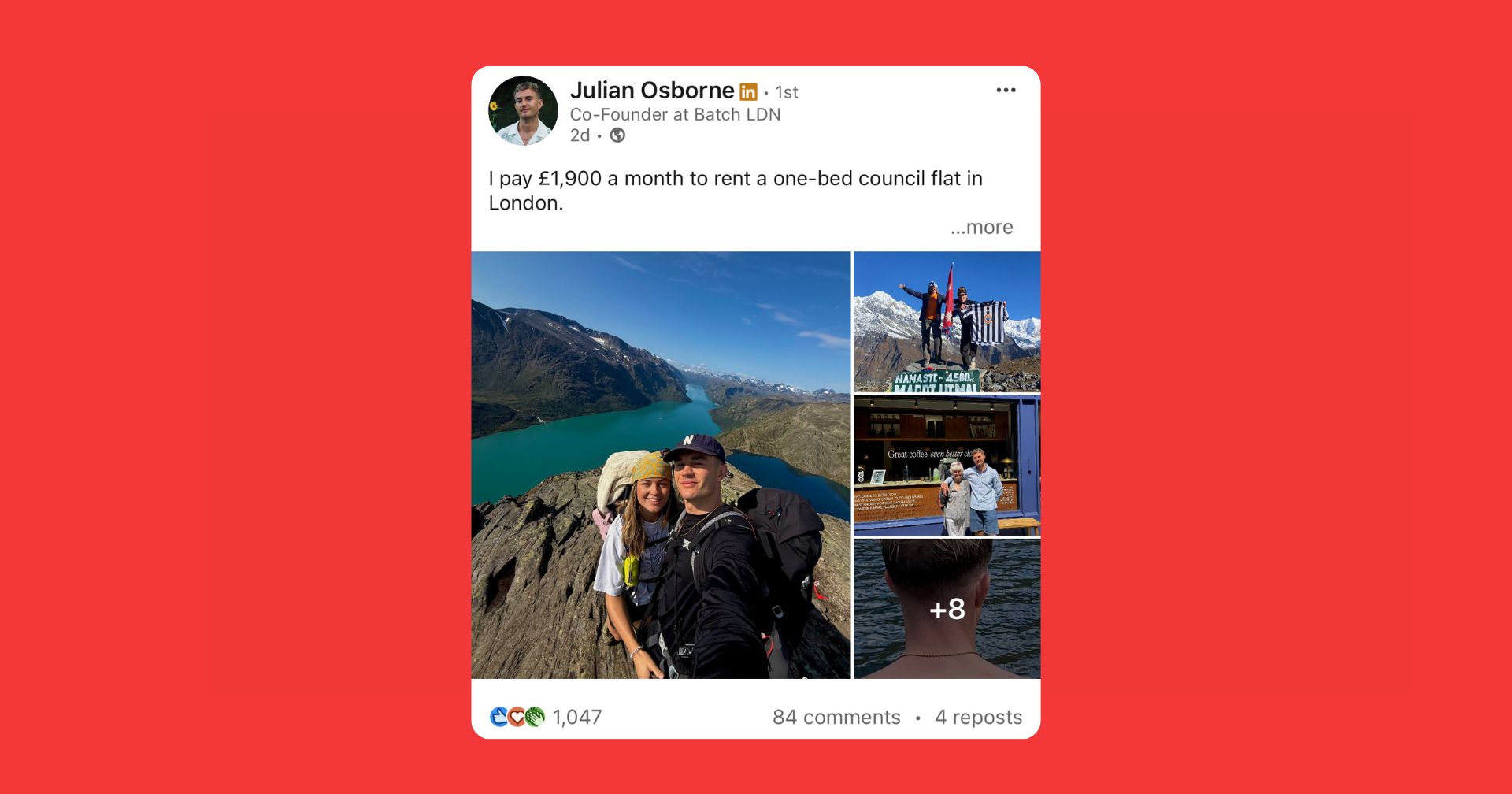
“I pay £1,900 a month to rent a one-bed council flat in London.
£122 a month on gas — because somehow, I’m “in debit.”
£188 on council tax — stings every month.
Last week I got 3 points and a £100 fine for doing 34 in a 30 in a Zipcar.
I’m miles off a house deposit.”
View the post here
Introducing: Julian Osborne.
🔥 THIS WEEK'S VIRAL BREAKDOWN
The Post: ‘I pay £1,900 a month to rent a one-bed council flat in London.’
The Numbers: 1,047 reactions, 84 comments, 4 reposts
Why it blew up:
This weaponised financial vulnerability as relatability.
Julian itemised the exact pain (£1,900 rent, £122 gas, £100 speeding fine) that thousands of professionals feel but rarely admit publicly. Then he flipped the script with a "but I'm fine actually" pivot, giving people emotional permission to stop catastrophising their own situations.
It's authentic financial pain wrapped in a permission slip to stop caring what people think. That emotional pivot from stress to freedom is exactly what makes people share content.
The 3-part viral formula:
The hook grabbed people in 3 seconds with brutal specificity - Opening with "I pay £1,900 a month to rent a one-bed council flat in London" is like a punch to the gut for anyone who's felt financially squeezed. Real numbers = real stakes. Specificity is credibility. You're not complaining, you're confessing. And confession is magnetic. Writing with I, I’m or I’ve always works well on Linkedin.
It broke LinkedIn's emotional norms + used platform mechanics - LinkedIn is a performance stage for success theatre. Admitting financial strain violates expectations, which triggers surprise and makes content sticky. Our brains remember pattern disruptions. The multi-image carousel doubles down and the algorithm loves it. the photos (mountains, mates, moments) provide visual proof of the "zoom out" message.
It gave people permission + a reusable script - People shared this because it gave them permission to stop playing the comparison game. "ZOOM OUT" becomes a phrase people can apply to their own lives. The post works because it identifies a common enemy (the rigged system that makes us feel inadequate), then shows there's a better way to think about life.
Your steal-this-now tactic:
The "Confession + Permission" framework:
Find what your audience is quietly struggling with, admit it publicly with specifics, then give them permission to care less about it.
The structure:
Confess something specific that breaks norms - Share what people in your space are supposed to hide (struggles, failures, unpopular truths)
Validate the pain - Don't minimise it. Let them feel seen.
Reframe it - Show them why it doesn't matter as much as they think, or offer a completely different way to look at it
Prove you mean it - Back it up with how you actually live/work/think differently
Why it works: Viral content often comes from saying what everyone's thinking but nobody's saying, then offering emotional release from that pressure.
Bottom line: Break the silence around hidden struggles, then show there's a better way to think about them. Relief is shareable.
That’s it for this week.
Before you go: Please help us make this even better.
If you think your friend or colleague would find this helpful, please forward it to them
Want us to review your content? Send it our way, just reply to this email.

